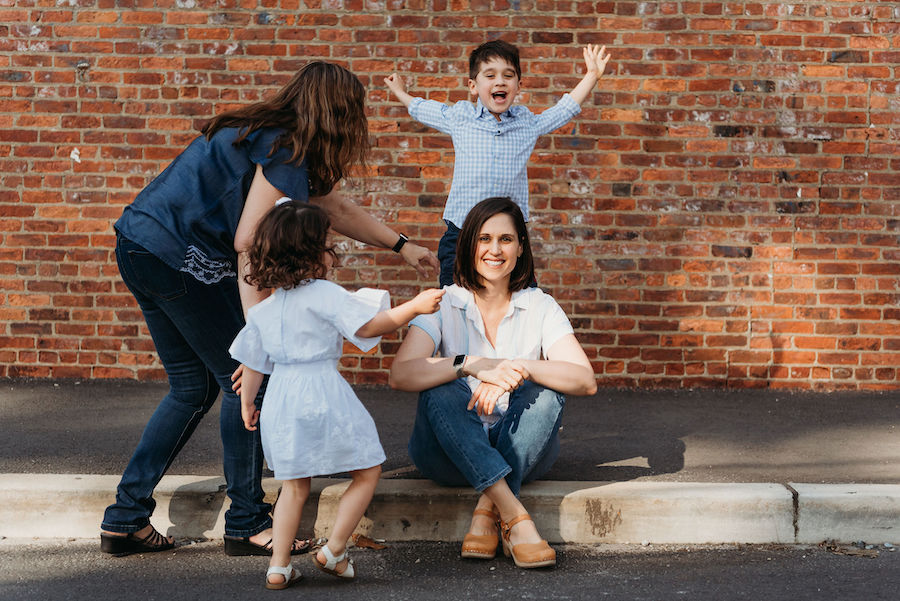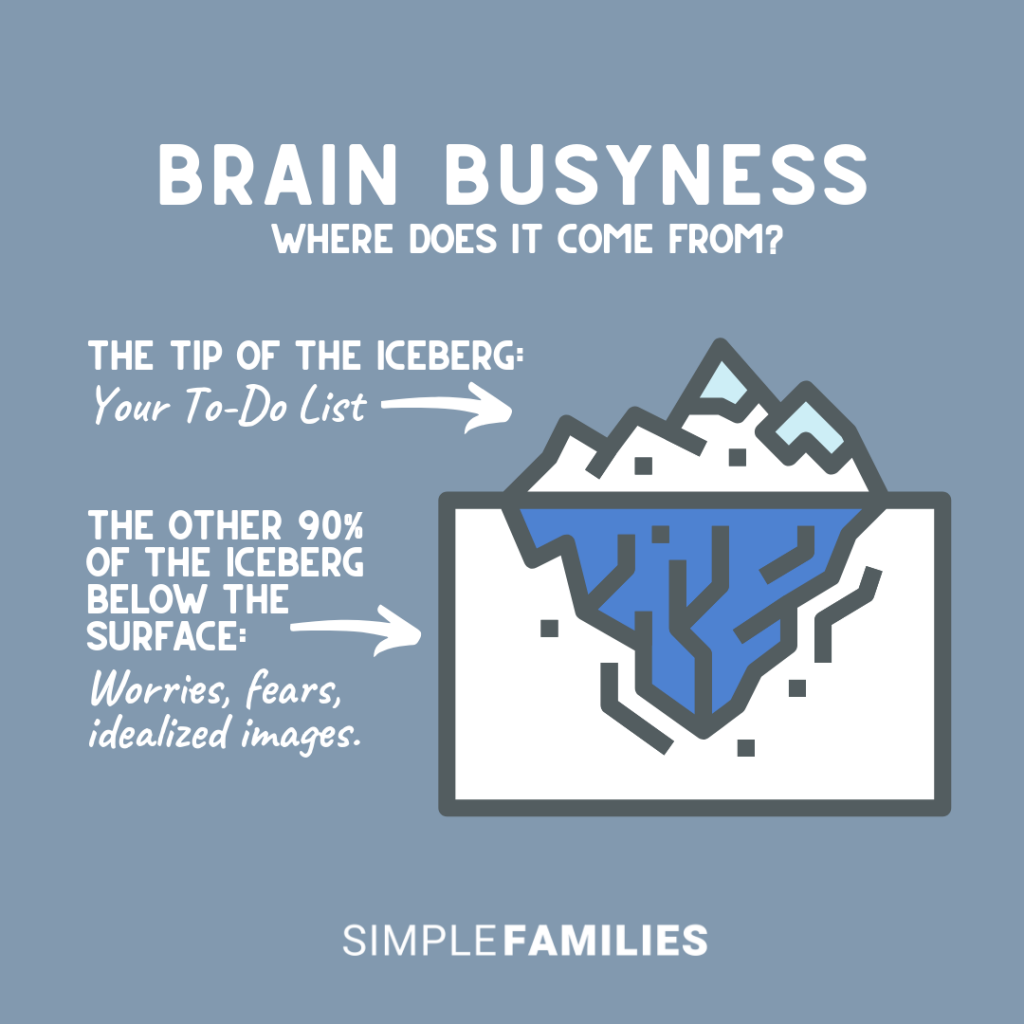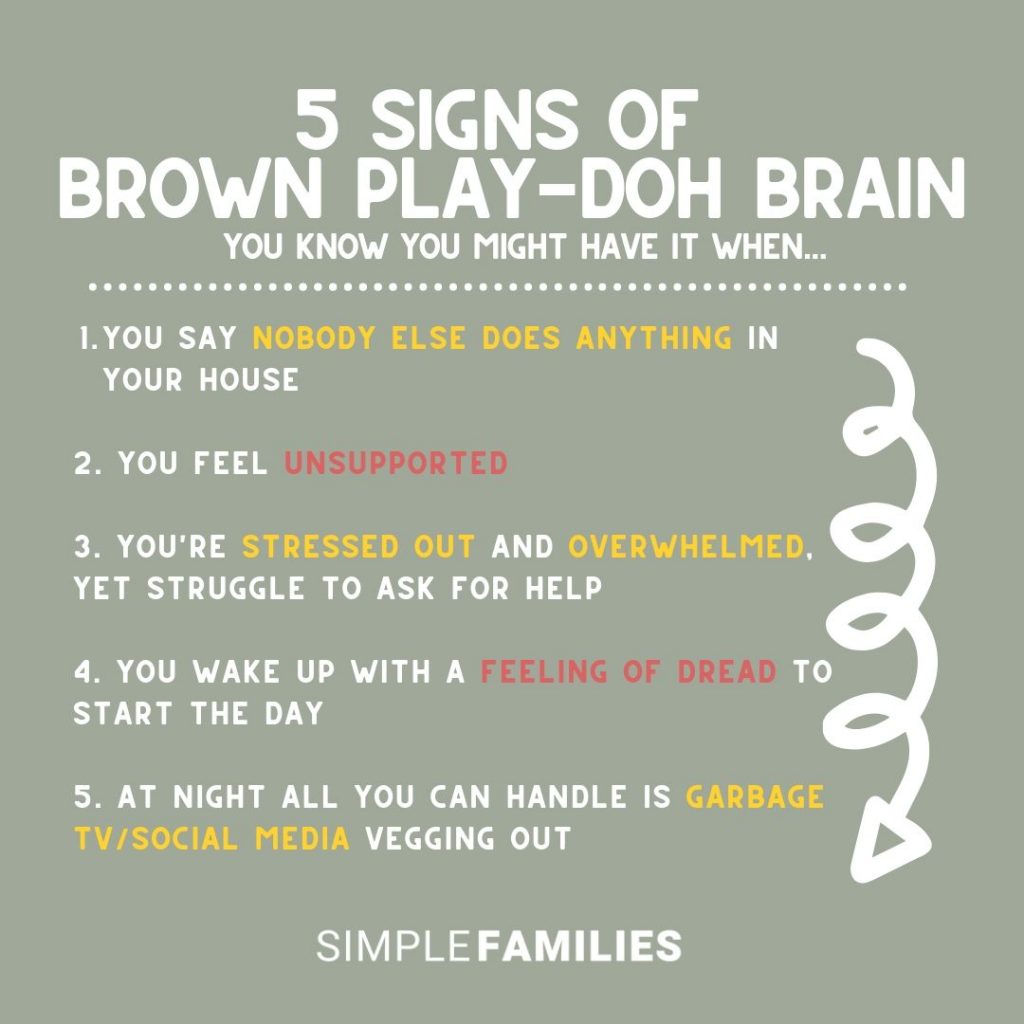
Podcast: Play in new window | Download | Embed
Summer is supposed to be relaxing, yet I have found that this summer we’ve had a lot of transition, a lot of change, and my brain has been very busy. Therefore, today’s episode is dedicated to just that: We’re talking about the “Tip of the Iceberg” and brain busyness.
[FULL TRANSCRIPTION]
This week we’re getting ready to launch The Mental Unload and it feels like a perfect time for me to go back through this program with you all again because of all the mental clutter going on in my brain. On the podcast and in the Simple Families community, we talk a lot about simplicity and minimalism being a journey. And not only is it a journey in your house with your physical stuff, but it’s also a journey in your mind with what’s cluttering up your brain.
Before we dive into today’s episode I want to bring you a quick listener’s spotlight, and this is coming from Lauren, who recently participated in The Mental Unload. I run it three times a year and she participated in the March edition. So her words really stuck with me because they resonated with me personally. Her story feels somewhat similar to mine, so I’ll go ahead and read what she had to say.
Lauren wrote:
“After my second child, I was feeling really burnt out, struggling to do it all and resentful of my partner. I felt guilty that I had the family I always dreamed of but I was feeling less happy. I thought maybe I needed to make a big life change like move close to family, or go back to school or work, and then I saw your Instagram post about The Mental Unload and it stopped me in my tracks.
I went into this process hopeful, but it really exceeded my expectations. Being more aware of when I’m being tipped towards my tendency of anxiety has helped me so much. I recently had a tough day that would’ve usually left me feeling pretty resentful towards my partner. This time though, I was able to recognize it creeping up, communicate with my partner, and talk through it together. I started with thanking my partner with what he had done for the day, even though I was feeling a little bit unsupported. He responded by doing something nice for me to make me feel better. I can’t believe I’m saying this, but I think my relationship with my in-laws has even been improved.”
I love these insightful words from Lauren because I think she touches on so many of the key issues that we cover in The Mental Unload. We’re starting this Thursday, July 25th, and if you want to join us I would love to have you.. The Mental Unload is a seven day program, but I know that some people like to take their time with it and move through it a little bit more slowly. So while you’ll receive the core content over the first seven days, I’ll hang with you for the next three weeks so you have a month altogether to work through, reflect, and process the information.
If you have questions, send me an email, and go to simplefamilies.com/unload and you can get all the details there. I would like to add that if you suffer from depression, or anxiety, or any other mental health challenges that you should talk to your doctor or your mental health professional before joining us.
I’m excited to get to know a whole group of you better starting this week, and I had done The Mental Unload a few times; I ran it for some groups, and I felt like I had to take a pause. And I couldn’t quite put my finger on why, but I think I have figured it out. So while I love this program and I truly believe in it, I’ve heard feedback from so many of you that have benefited greatly from it, I only do run it three times a year because it gets to be pretty heavy and it becomes part of my mental load, holding space for so many women. So in order to counteract that, I’ve brought Jane on board. I interviewed Jane in episode 165, and Jane is helping me to support you all. But as with all my live programs I am there in the trenches with you, talking with you and getting to know you all, mainly through the live coaching sessions and the community group, which by the way you don’t have to have Facebook to participate in.
So in honor of The Mental Unload, we’re talking about brain busyness, and my brain has felt incredibly busy and incredibly heavy over the course of the past month. I’m calling this episode “The Tip of the Iceberg”. Now when we say “the tip of the iceberg,” we’re referencing the fact that, when it comes to icebergs, we can only see the very tip. Only about 10% of icebergs are visible with the naked eye, and 90% of icebergs exist under the water. So this expression, “the tip of the iceberg,” has become used commonly in language because it references that sometimes we can only see part of something; the part that’s easily observed. But the rest of it is hidden. We only know a very small part, and the unknown is much larger.

And for many of us, especially us raising children, the tip of the iceberg is our to-do list. It is the part of our brain and the part of our busyness that is tangible. We often write it down; we can see it, we can feel it, we can do it. So when you’re stressed out and overwhelmed, you’re probably going to head right for that to-do list. You might start rattling off to your partner, “Well, first I have to get up, and I have to make lunches, and then I have to bathe the kids, and then I have to get them ready for camp. And I have to do this, and that.” The tip of the iceberg, the visible part of the busyness of the brain, is often the things that we have to do, the things that we have to execute.
And this happens because as humans we take the path of least resistance; we tend to focus on the easy stuff, the stuff that we can see. The result is that we often feel overwhelmed and under-supported, and even if you have a loving partner who wants to help, you might struggle with explaining how they can help. You might feel like nobody in your house does anything.
If you’re feeling overwhelmed and under-supported, you’re probably having a hard time communicating to the people around you the things that you need support with. And very likely the reason that you’re having a hard time communicating is because most of those things that you need support with, most of the things that are really weighing you down and stressing you out, are actually not the tip of the iceberg, they’re not the to-do list. They are what’s underneath the surface.
In the first step of The Mental Unload, we do a massive brain dump and we bring to our awareness all the things that are really going on and really keeping our brains busy. And most people go into this thinking, “Okay, yeah, it’s my to-do list. I have a busy life,” and society values busy as better, so often we end up striving for a busy life. But as these busybodies find out as they start diving deeper, is that the to-do list and the things that they have to execute on a regular basis are really just the tip of the iceberg. What is really weighing them down and stressing them out is what lies below the surface, and that’s their worries and their fears, and very often this idealized image of what a mother or what a parent should be doing.
If you would’ve asked me a couple years ago if I was a perfectionist, I would’ve said no, definitely not. But the more work and self-development that I did, I realized that I was in fact chasing this idealized image of a mother; the mother that should be doing everything and should be everything, the perfect mother. And I do believe that the perfect mother, this idealized image, actually lies within all of us, every one of us. And in many ways, she is really anchoring the iceberg down. She is causing the worries, and causing the fears, and causing the overwhelm. She is what makes us feel like we’re not enough. She’s the one that is going to make us feel like we are never doing enough for our kids; our house is never clean enough, we are never thin enough, our kids are never happy enough.
For most of us it happens almost accidentally. We start chasing this image of the perfect mother and trying to replicate parts of her without even realizing that we’re doing it. And because the perfect mother doesn’t actually exist, we’re never going to be able to attain it, we’re never going to be enough when that’s the goal. You are never going to be able to have the organic garden, the full-time corporate career, read a dozen books a day, be a size two; you know, all the things that the perfect mother does, all the things that we in some way are striving towards.
So we have to stop chasing this image of the perfect mother and we have to realize the role that she plays on our own individual well-being, and how she impacts our stress levels, and our worries, and our fears. Because when we do that, we can start setting goals that are realistic for us. You’re never going to be the perfect mother, but you already are the perfect mother for your child. And the painful realization that hit me was that if I’m chasing perfection, that’s what I’m teaching my kids to do too. And as a result, I’m setting them up for this race towards nowhere.
So when we look underneath the tip of the iceberg, we see what’s lying under there, and what’s lying under there are often all the things that we feel like we should be doing, and the person that we feel like we should be; the areas where we feel like we’re not enough, and we’re not doing enough. And it can be pretty scary underneath the tip of the iceberg. That’s the reason we never dive under and take a look at it. It’s much easier to explain our stress and overwhelm in terms of the events in our calendar and the number of items on our to-do list.
Now don’t get me wrong, those things do add weight to your mental load for sure. But if you find yourself feeling unsupported, and if you feel like you’re the only one in the house doing anything, if you find yourself waking up with feelings of dread, or if you use social media and garbage TV at night until you fall asleep, there might be more to your overwhelm than just what you can see on the surface. You might need to develop a better understanding of what’s going on down there. Because if you’ve ever had someone ask you, “How can I help you?” and you didn’t know what to say, you didn’t know how to ask for help, it can become a strain on the relationship.
If you’re overwhelmed and unable to articulate why you’re overwhelmed, I often call this brown Play-Doh brain. And I had this realization one day when I was feeling particularly overwhelmed a couple years ago, and I sat myself and I said, “What is it that is so overwhelming to you? Why are you so overwhelmed right now? What is it that has to be done today?” And the reality was there was nothing that had to be done right at that moment. There was no task that couldn’t be put off until tomorrow. The overwhelm wasn’t coming from my to-do list, the overwhelm wasn’t coming from the events on my calendar; the overwhelm was coming from what was below the surface, my worries and my fears.

And the reason that I call this brown Play-Doh brain is, well first of all, I hate brown Play-Doh; I hate when my kids mix all the Play-Doh colors together. It drives me totally bonkers because I feel like it’s ruined. Once you mix all the colors together, it’s impossible to parse them apart. It just feels like a big mess. And when I’m stressed out and overwhelmed, that’s how my brain feels; it feels like a big mess and I can’t make heads or tails of it. And then I go around complaining that I’m unsupported, complaining that I do everything in my house and no one else does anything while I’m simultaneously unable to articulate how others can help me.
And that, my friends, is brown Play-Doh brain, and I absolutely have improved my brown Play-Doh brain in the past couple of years. As I’ve become more aware of my overwhelm and the pieces of it, I’ve been able to manage it before it gets too bad. I’ve been able to prevent my brain from turning into mush. I’ve been able to prevent the overwhelm before it creeps up and gets to be too much. But it’s a journey. Simplifying and reducing clutter, both physical and mental, is something that we’re going to be doing for the rest of our lives. But at least now I have a process to work through, and my baseline level of overwhelm is far, far lower than it’s ever been before. Now I’m completely aware that life is full of roller coasters, but the peaks and valleys of the roller coasters feel less extreme since I started simplifying my brain, and reducing the mental clutter, and really getting a grip on my mental load.
So that’s just a few thoughts on the tip of the iceberg and brain busyness for today. And if any of this resonates with you and you want to join us in The Mental Unload, I’d love to have you and get to know you better. We start on Thursday, July 25th. And if you have any questions, email those to me at [email protected] and I’d be happy to chat with you more.

